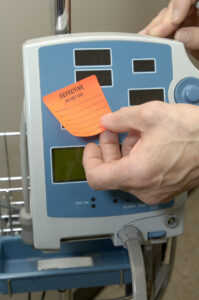Medical devices play a crucial role in healthcare, helping millions of people regain mobility, monitor health, and live fuller lives. But what happens when a medical device meant to improve your health actually causes harm? Thousands of people across the country experience serious harm from faulty devices, ranging from pacemakers to hip implants.
What Is a Defective Medical Device?
A defective medical device is one that doesn’t perform as intended, leading to harm or injury. This could be due to a design flaw, manufacturing error, or even failure to properly warn patients about the potential risks.

- Implanted devices like faulty pacemakers, hip replacements, or breast implants.
- Surgical tools such as scalpels or bone saws that malfunction during procedures.
- Diagnostic equipment that provides inaccurate readings, like malfunctioning glucose meters or MRI machines.
- Devices tied to medications like insulin pumps that fail to properly deliver medication.
When these devices malfunction, the results can be devastating. From infections to permanent disabilities or even death, the physical and emotional toll can be overwhelming. Not to mention, there are often significant medical bills and lost wages to contend with.
How Do Personal Injury Claims Work for Defective Medical Devices?
If a medical device has caused harm, you may be able to file a personal injury claim to seek compensation for your injuries. These types of claims are most often based on the law of products liability, which holds manufacturers accountable for unsafe products. In the case of defective medical devices, the manufacturer or distributor may be held liable if the device was poorly designed, improperly made, or if they failed to adequately warn patients or doctors about potential risks.
Personal injury claims involving defective medical devices usually fall under one of these categories:
- Design Defects: The device was inherently dangerous, even before it was manufactured.
- Manufacturing Defects: The device was poorly made or damaged during the production process.
- Failure to Warn: The manufacturer did not provide proper warnings or instructions about the device’s risks.
Proving Your Case
Proving a personal injury claim for a defective medical device is complex. You’ll need to show that the device was defective and that the defect directly caused your injuries. This requires expert testimony and evidence from medical professionals, engineers, or other specialists.
Critical points you’ll need to prove include:
- Defective Design, Manufacturing, or Warnings: Evidence that the device was unsafe either from the start or due to a manufacturing error, or that the warnings were inadequate.
- Causation: That the defect in the device directly caused your injury.
- Damages: Documenting the physical, emotional, and financial impact of the injury.
What Damages Can Be Recovered in Massachusetts?
If your claim is successful, you may be entitled to receive compensation for damages including:
- Medical Costs: Treatment, surgeries, hospital stays, and rehabilitation.
- Pain and Suffering: Compensation for the physical and emotional distress caused by the injury.
- Lost Wages: If you missed work due to your injury, you can claim lost income.
- Future Expenses: If your injury requires ongoing medical care or results in long-term disability, you can be compensated for future costs.
- Punitive Damages: In cases of wrongful death or a violation of Massachusetts’ consumer protection laws, punitive damages may be awarded to punish the manufacturer.
SUGARMAN attorneys have decades of experience in bringing product liability claims. If you or a loved one has suffered injury as the result of a defective medical device, you may be entitled to compensation. To speak to one of our partners call 617-542-1000, fill out our contact form or email us at .
